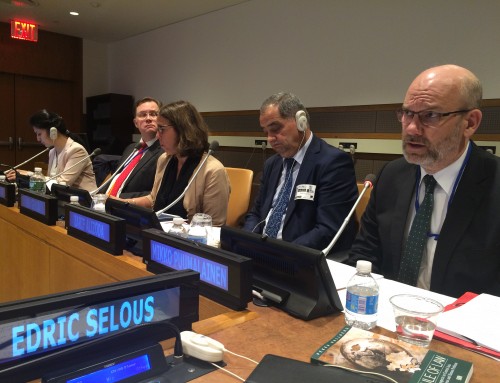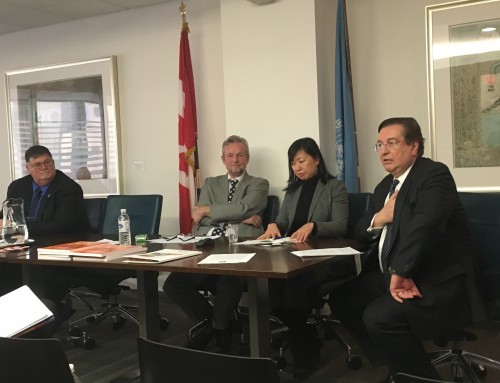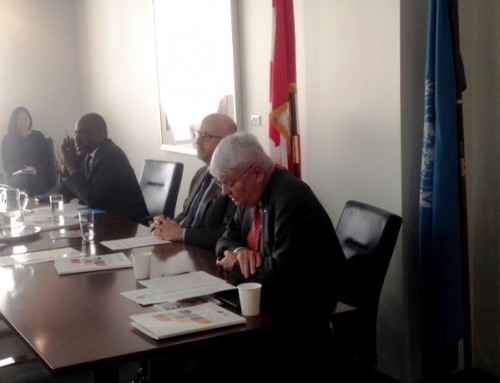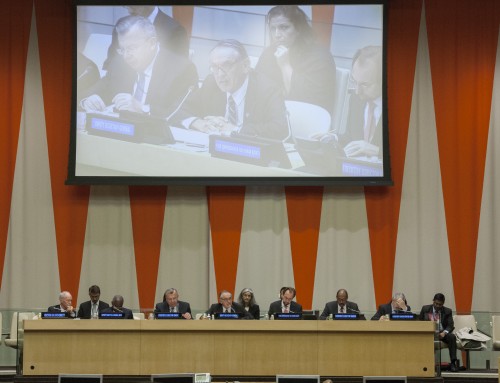On 3 November 2015, UNHCR convened a High-Level Panel on the importance of nationality in today’s world, coinciding with the launch of a new report titled ‘I am Here, I Belong: The Urgent Need to End Childhood Statelessness’ (the ‘Report’). The Panellists included High Commissioner for Refugees Antonio Guterres, UNHCR Goodwill Ambassador Barbara Hendricks, the Permanent Representative of Brazil to the UN Antonio Patriota, and the Chairperson of the Committee on the Rights of the Child Benyam Mezmur.
Mr. Guterres emphasised that statelessness is one of the lesser known human rights problems facing the world and often forgotten by the international community. He noted that the 1961 Convention on the Reduction of Statelessness (‘Statelessness Convention’) has many fewer signatories than the 1951 Convention relating to the Status of Refugees, notwithstanding good progress with accessions in recent years. The new Report, which contains the testimonies by stateless youth and children from seven countries around the world on the effects of statelessness, is intended to help give a human face to something that remains an abstract problem for many. Mr. Guterres welcomed the progress made in recent years with 50 States having acceded to the two statelessness conventions since 2011, and a number of countries, including Côte d’Ivoire and Thailand, taking measures to confirm nationalities or naturalize persons without citizenship and thereby significantly reduce the number of stateless people within their borders.
Mr. Guterres referred to UNHCR’s #IBelong Campaign to End Statelessness, which aims to eradicate statelessness by the year 2024, and identified four actions highlighted in the new Report that are essential to achieving this goal. First, states should grant nationality to anyone born on their territory if that person would otherwise be stateless. Second, gender discrimination must be removed from nationality laws, allowing women to pass on nationality to their children in the same way as men. 27 countries continue to restrict women’s ability to pass on nationality to their children, including Syria, which is of particular concern in the context of the current crisis where many women are fleeing without their husbands and give birth abroad to children who may be at risk of statelessness. Third, nationality laws that discriminate based on grounds such as ethnicity or religion must be reformed. Lastly, states must ensure birth registration for all children, as this helps prove legal identity and lowers the risk of statelessness.
The reality of living without documentation and nationality was highlighted on the panel by the testimony of Jirair, a young stateless man residing in Georgia, whose case is included in the Report. He described a life full of frustrations, including difficulties in securing employment in the formal economy and the inability to pursue his athletic ambitions, concluding that his status made him feel “like an invalid”. On a positive note, he shared that he had recently obtained documentation that enables him to travel, including to New York for this event.
Mr. Patriota highlighted Brazil’s efforts and best practices on reducing and preventing statelessness. Birth registration is an important first step toward ending statelessness, which is why the inclusion of the provision of legal identity as a target under Sustainable Development Goal 16 is very welcome. Statelessness can often easily be resolved by minor changes to existing law. Mr. Mezmur emphasised that the effects of statelessness are far reaching and often passed on from parents to their children. The Report documents serious consequences of statelessness ranging from inadequate access to – if not exclusion from – healthcare and education. It also points to increased vulnerability to abuse and trafficking, continuing cycles of poverty, and a significant psychological toll.
A number of delegations present, including Germany and the United States, reiterated their commitment to end statelessness and their support for UNHCR’s work. Thailand highlighted domestic measures to address the issue, for example improving administrative citizenship procedures, which resulted in over 18,000 formerly stateless persons receiving Thai citizenship over the last three years.
The High-Level Panel concluded with closing remarks by Ms. Hendricks, who emphasized that eradicating statelessness by the year 2024 will be a monumental challenge, requiring acknowledgement of the issue and action by states.
The Report ‘I am Here, I Belong: The Urgent Need to end Childhood Statelessness’ can be found here:
http://www.unhcr.org/ibelong/wp-content/uploads/2015-10-StatelessReport_ENG16.pdf












